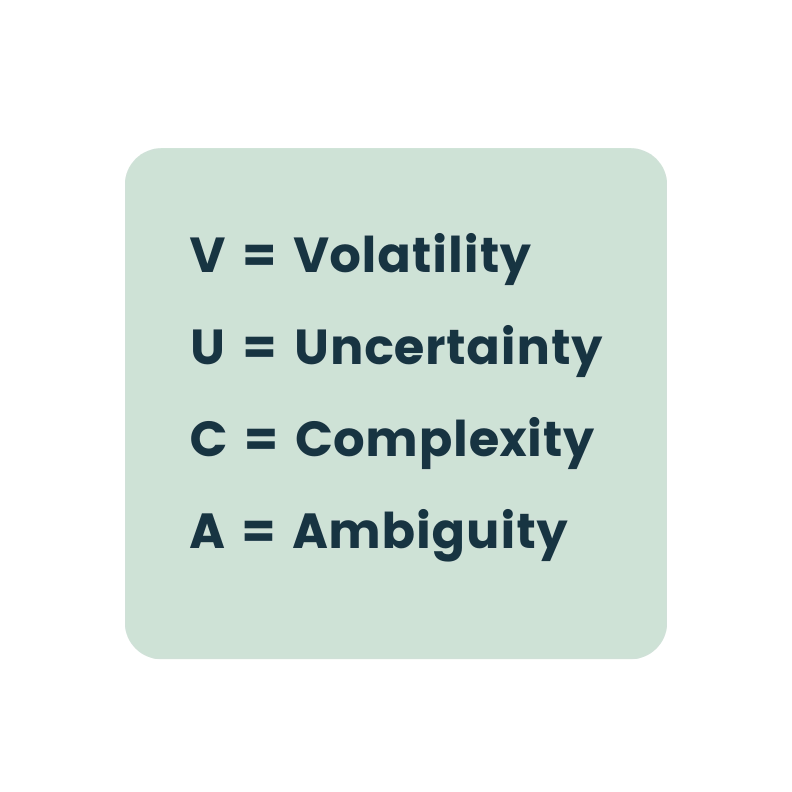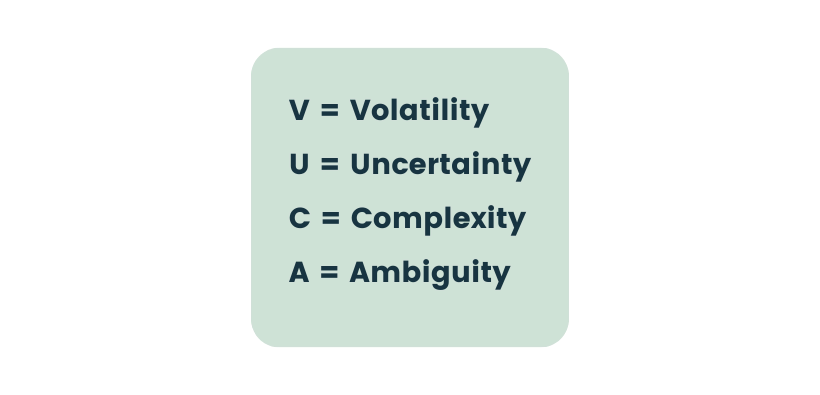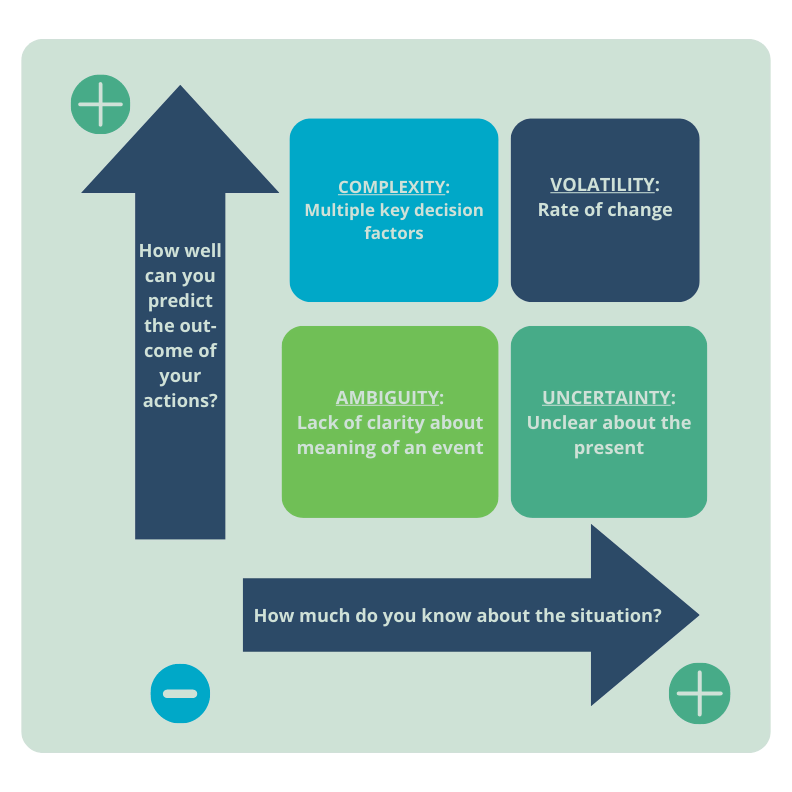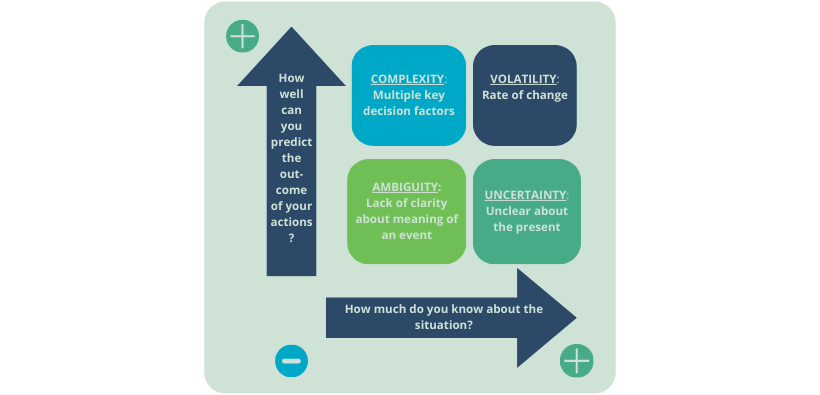Society is undergoing constant change, which is reflected in the corporate world. Consultants are therefore challenged by their tasks in several areas in the current world. On the one hand, they help companies adapt to change and evolve their business models, but on the other hand, they are also challenged to operate in challenging times and gain the skills they need to prepare for a dynamic and often unpredictable world.
A key competency that consultants will need along the way is the understanding and ability to operate and navigate in this so-called VUCA world. VUCA is an acronym that stands for Volatility, Uncertainty, Complexity and Ambiguity.
1. What Is VUCA?
The roots of the term VUCA can be traced back to the late 1980s and early 1990s, when the U.S. military began using it to describe the multidimensional complexity and uncertainty of modern military operations (compare: Cynefin Framework and the Stacey Matrix).
Origin and first use:
The term VUCA was coined as the world evolved from a bipolar order with two dominant superpowers (the Cold War) to a multipolar order with a multitude of actors. This new world order was characterized by rapid, unpredictable change and increasing complexity. A situation the military termed "VUCA".
Evolution over the past 20 years:
Over the past two decades, the term VUCA has moved away from its military origins and into the business world. During the 2008 global financial crisis, the term gained wider currency as executives sought ways to describe and navigate the turbulent and uncertain business environment.
Since then, VUCA has become a useful concept for understanding and responding to the challenges of the modern macro-level business environment. Executives use VUCA to recognize the volatility and uncertainty of their markets, manage the complexity of their organizations and processes, and deal with ambiguity in the information landscape.
Especially in times of high global uncertainty, such as during the COVID-19 pandemic, the VUCA concept has proven to be particularly relevant. It helps managers to recognize the high level of uncertainty and volatility while emphasizing the need to adapt quickly to changing circumstances and respond flexibly to new situations.
2. The VUCA World
A VUCA world is thus one in which change and uncertainty are the order of the day.
- Volatility refers to the speed and magnitude of change.
- Uncertainty represents the unpredictability of events and impacts.
- Complexity refers to the multiple factors that can influence decisions.
- Ambiguity means the ambiguity of interpretation of data and events. Points we will discuss in more detail below.
In a VUCA world, there are no easy answers or linear solutions. Instead, situational leadership, adaptability and continuous learning are required. It is a world that offers both opportunities and risks, in which the ability to change and adapt quickly can become a decisive competitive advantage.
3. VUCA in the Context of Business World
In today's business world, VUCA is often understood as a call to rethink leadership styles and management approaches and to develop competencies required in a volatile, uncertain, complex and ambiguous environment. This includes aspects such as strategic thinking, adaptability, emotional intelligence, systemic thinking, and a forward-looking, visionary mindset. However, it is important to understand the origins and challenge the tendencies. In this way, the individual areas can be ideally related to examples from the life of a consultant.
Volatility:
In the business world, volatility refers to the speed, scope, and nature of change that companies experience. This can be due to many factors, such as technological developments, changes in market conditions, or geopolitical events. For example, disruptive technology such as artificial intelligence can rapidly change the market and challenge traditional business models. Or the introduction of new trade policies and tariffs can suddenly increase the cost of goods and services, making the business landscape more volatile.
Uncertainty:
Uncertainty refers to the degree of unpredictability in the economy and markets. It can arise from a variety of sources, such as economic fluctuations, political changes or the spread of a global pandemic. For example, the Brexit decision created significant uncertainty for businesses in the UK and Europe, as it was difficult to predict what the future trade relationship would look like.
Complexity:
Complexity refers to the multitude of interconnected factors that companies must consider in order to function effectively. This can include the complexity of their supply chains, their organizational structures, the technologies they use, or the markets in which they operate. For example, increasing globalization has led to more complex supply chains where disruptions in one location can have global impact, as was the case during the COVID-19 pandemic.
Ambiguity:
Ambiguity refers to the uncertainty or lack of clarity about the meaning of something. In the business world, this can refer to unclear or conflicting information that influences decisions and strategies. For example, a company entering a new market may encounter ambiguous information about the market, competitors, and customer needs, which affects strategy development and decision-making.
All of these factors can present both challenges and opportunities for companies. In a VUCA world, it is critical for organizations to understand these dynamics and develop strategies and capabilities to manage them effectively.
4. VUCA Leadership
VUCA leadership refers to the leadership styles and techniques that are effective in a VUCA world. This concept emphasizes agility, flexibility, and resilience. VUCA leaders must be able to make quick and informed decisions in uncertain and complex situations.
VUCA leadership requires a deep understanding of the dynamics and complexity of the business environment and the ability to interpret and respond to ambiguous information. It also requires the ability to lead a team through change, foster a culture of continuous learning, and create an environment in which innovation can thrive.
5. VUCA Leadership and VUCA Management
VUCA leadership goes beyond individual leadership styles and extends to the entire management of the organization, which is referred to as VUCA management. Leaders and managers must not only adapt to constant change and uncertainty, but also empower the entire organization to do so.
Impact on business decisions:
In a VUCA world, decisions are more difficult and complex. Volatility and uncertainty can make traditional decision-making models based on the predictability and stability of events less effective. As a result, leaders must develop the ability to operate in uncertainty, pursuing both short-term and long-term strategies. They must be prepared to make decisions based on incomplete or uncertain information and to adapt quickly as circumstances change.
Impact on innovation:
VUCA can also impact innovation within an organization, both positively and negatively. In volatile and uncertain markets, companies that respond quickly to change and develop innovative solutions can gain a competitive advantage. Therefore, VUCA management requires a culture of innovation where creative thinking is encouraged, risks are accepted, and failure is seen as an opportunity for learning and growth.
Effects on project management:
In project management, VUCA leads to increased complexity and uncertainty. Project managers need to be flexible and agile to respond to unforeseen challenges. This may require the use of agile project management methods (e.g., Scrum or Kanban) that enable iterative development and constant adaptation. In addition, project management in a VUCA world requires effective communication and collaboration to ensure that all team members are up to date and can respond to change together.
In summary, leading and managing in a VUCA world requires a high degree of flexibility, adaptability, and agility. Successful VUCA leaders and managers must not only be able to respond to change and uncertainty, but also be able to enable their organizations to overcome these challenges and use them as opportunities.
6. Three Examples of VUCA From Consulting
VUCA situations occur frequently in consulting. Here are three examples:
- Market entry strategy in volatile markets:
When a client intends to enter a new, volatile market, a consultant must develop a strategy that considers both potential opportunities and risks. This requires a deep understanding of market volatility and the ability to develop robust strategies that are effective under uncertain conditions. - Digital transformation: in a time of rapid technological change, consultants help companies rethink and adapt their digital strategies. In doing so, they must consider a variety of factors, from changing customer expectations to regulatory uncertainties.
- Post-merger integration:
After a merger or acquisition, companies often face a number of complex challenges, from bringing together different corporate cultures to integrating systems and processes. Consultants must help manage this complexity and contribute to a successful integration.
7. Why Is VUCA Relevant For Consultants?
VUCA is relevant for consultants for several reasons. First, it helps them understand the challenges their clients face and develop appropriate solutions. Second, working in a VUCA world requires consultants to have a high level of adaptability, strategic thinking, and leadership skills. Finally, VUCA also offers opportunities: by helping their clients to navigate a VUCA world, consultants can deliver significant added value and strengthen their own role as strategic partners.
8. Conclusion
Navigating a VUCA world requires a high degree of adaptability and resilience from companies and their consultants. However, VUCA also offers a wealth of opportunities for those willing to embrace the challenges and find new ways to succeed in uncertain and complex environments. For aspiring consultants, understanding and mastering VUCA provides an important foundation for a successful career in consulting.






